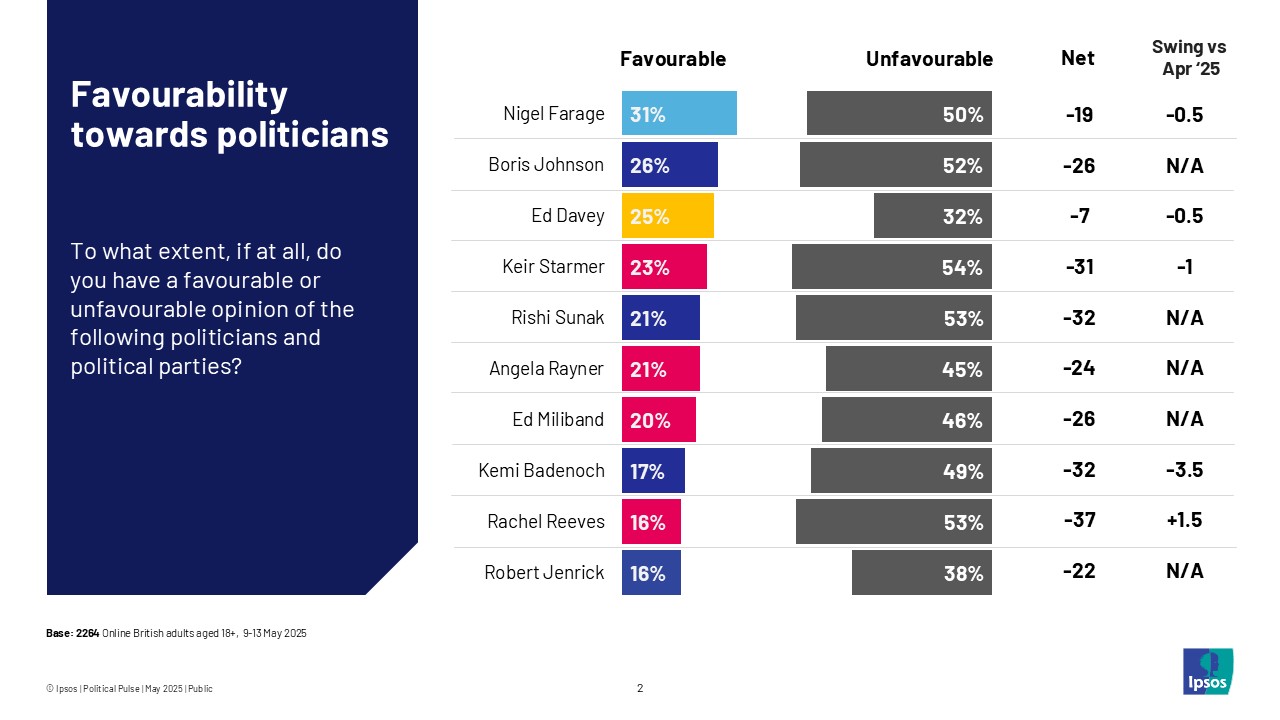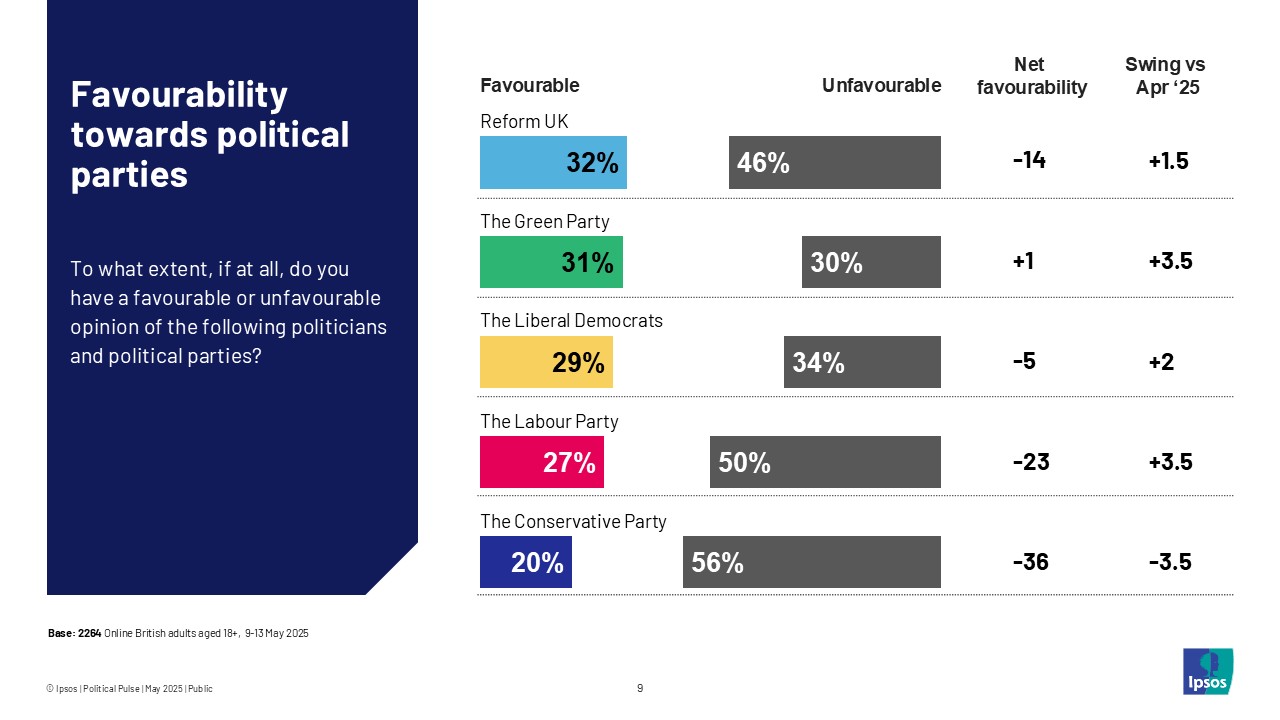Badenoch drops to worst Ipsos favourability score as Conservative leader, while Farage continues to top ratings
The latest edition of the Ipsos Political Pulse survey, taken between the 9th and 13th of May, finds that Nigel Farage continues to top Ipsos favourability ratings. The Green party and Labour have also both seen an uptick in support, while Kemi Badenoch and the Conservatives continue to struggle.
Favourability towards politicians

- 31% hold a favourable opinion of Reform UK leader Nigel Farage. Half (50%) are unfavourable, giving him a net favourability rating of -19, similar to last month. His net ratings among Reform’s 2024 voters are a very positive +76, +4 among 2024 Conservatives, but -41 among 2024 Labour voters.
- 23% of Britons have a favourable view of Prime Minister Keir Starmer, the same as last month. 54% are unfavourable, giving him a net approval rating of -31.
- 17% hold a favourable opinion of leader of the opposition Kemi Badenoch and 49% unfavourable, giving her a net rating of -32, down from -25 last month. Her unfavourable score of 49% is her worst since becoming Conservative party leader (the previous low was 46% in January this year).
- Shadow Justice Secretary Robert Jenrick follows closely behind, with 16% favourable and 38% unfavourable (net -22).
- Amid rumours that former Prime Minister Boris Johnson wishes to return to front line politics, 26% are favourable towards him, while 52% are unfavourable, giving him a net rating of -26. His ratings are marginally better than Rishi Sunak’s, who has a net rating of -32.
- Among 2024 Conservative voters, Kemi Badenoch receives a positive net rating of +23, Robert Jenrick’s score is +22, both behind former leaders Rishi Sunak and Boris Johnson who each have a net rating of +33 (Johnson receives the best score among 2024 Reform voters of +5, compared with Sunak on -45, Jenrick -12, and Badenoch -36).
- A quarter (25%) hold a favourable view of Liberal Democrat leader Ed Davey, while 32% are unfavourable, giving him a net score of -7. This is the lowest amount of unfavourability of any politician polled, but he also receives a relatively high number of neutrals and don’t knows (43%).
- 16% of Britons hold a favourable view of Chancellor Rachel Reeves. 53% are unfavourable, giving her a net favourability rating of -37, little changed from -40 last month.
- Among other Labour Cabinet Ministers, Angela Rayner and Ed Miliband receive slightly less criticism than Rachel Reeves, with net ratings of -24 and -26 respectively.
- Among Labour 2024 voters, Keir Starmer receives a positive net favourability rating of +24, compared with 0 for Rachel Reeves, +20 for Angela Rayner, and +16 for Ed Miliband.
Favourability towards political parties

- The Labour Party has seen a small improvement in its ratings over the past month. 27% are favourable towards the party of government, up from 23% in April. Half (50%, down from 53% last month) are unfavourable, giving a net favourability rating of -23 (up from -30 last month).
- Two in ten (20%) express a favourable view of the Conservative party, with 56% unfavourable. This gives them a net rating of -36, down from -29 last month.
- The Green Party’s net rating is +1, up from -6 last month. They have the lowest unfavourability rating of any party polled – though 4 in 10 (39%) are neutral or don’t know. 31% (up from 25% in April) are favourable towards the party, while 30% are unfavourable.
- The Liberal Democrats sit at -5, up slightly from -9 last month. Three in ten (29%) express a favourable view and 34% unfavourable.
- Reform UK has a net rating of -14 (a marginal improvement from -17 last month). 32% hold a favourable view of the party, with 46% unfavourable.
Which Cabinet and Shadow Cabinet ministers are the public noticing in the news?
- Out of a list of Cabinet Ministers (excluding Keir Starmer), the British public are most likely to have seen, read, or heard something about Rachel Reeves (39%) in the past couple of weeks, followed by Angela Rayner (27%), Ed Miliband (27%), and Wes Streeting (26%).
- Around half (49%) of British adults do not remember seeing, reading or hearing something about a member of the Conservative Shadow Cabinet (excluding Kemi Badenoch) in the past couple of weeks. Among those who have, Britons are most likely to have heard something about Robert Jenrick (18%), Priti Patel (13%) and Mel Stride (9%).
Government performance
- 59% say the country is heading in the wrong direction, and just 18% say right. This is a net negative rating of -41, similar to the -40 rating recorded last month.
- When asked to score the government’s performance on a scale of 0-10, the mean score overall is 3.7 (similar to the 3.8 recorded last month). The government scores continue to be highest among younger Britons aged 18-34 (5.2) and 2024 Labour voters (5.7), while those aged 55+ (2.8) and 2024 Reform UK (1.5) and Conservative (2.4) voters score it lowest.
Gideon Skinner, Senior Director of UK Politics at Ipsos said:
Our favourability ratings this month show a mixed bag for the UK's leading politicians. While Labour has seen a slight bump in favourability, most people still think the country is heading in the wrong direction and are critical of the Prime Minister and Chancellor. In contrast, Nigel Farage and his party continue to be buoyed by very high approval ratings among their own base, even though they are more divisive among Labour, LibDem and Green supporters. The Conservatives, though, face perhaps the toughest picture, with Kemi Badenoch's rating dipping to its lowest level as Conservative leader and the party's overall favourability continuing to be the lowest of any party polled. The Conservatives are finding it particularly difficult to rebuild after their losses in the 2024 election, but both the main two parties are struggling with public disillusionment with the established political order, and a potential appetite for alternative voices in British politics from both sides of the spectrum.
Technical note:
- Ipsos interviewed a representative sample of 2,264 adults aged 18+ across Great Britain. Interviews were conducted online between the 9th-13th May 2025.
- Data are weighted to match the profile of the population. All polls are subject to a wide range of potential sources of error.




